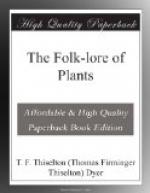1. Tylor’s “Primitive Culture,” 1873, i. 130.
2. See “English Folk-lore,” pp. 42, 43.
3. “Primitive Manners and Customs,” p. 74.
4. Dublin University Magazine, December 1873, p. 677.
5. See Swainson’s “Weather-lore,” p. 257.
6. See “Flower-lore,” p. 226.
7. See Notes and Queries, 1st Ser. II. 511.
CHAPTER XI
PLANT PROVERBS.
A host of curious proverbs have, from the earliest period, clustered round the vegetable world, most of which—gathered from experience and observation—embody an immense amount of truth, besides in numerous instances conveying an application of a moral nature. These proverbs, too, have a very wide range, and on this account are all the more interesting from the very fact of their referring to so many conditions of life. Thus, the familiar adage which tells us that “nobody is fond of fading flowers,” has a far deeper signification, reminding us that everything associated with change and decay must always be a matter of regret. To take another trite proverb of the same kind, we are told how “truths and roses have thorns about them,” which is absolutely true; and there is the well-known expression “to pipe in an ivy leaf,” which signifies “to go and engage in some futile or idle pursuit” which cannot be productive of any good. The common proverb, “He hath sown his wild oats,” needs no comment; and the inclination of evil to override good is embodied in various adages, such, as, “The weeds o’ergrow the corn,” while the tenacity with which evil holds its ground is further expressed in such sayings as this—“The frost hurts not weeds.” The poisonous effects, again, of evil is exemplified thus—“One ill-bred mars a whole pot of pottage,” and the rapidity with which it spreads has, amongst other proverbs, been thus described, “Evil weeds grow apace.” Speaking of weeds in their metaphorical sense, we may quote one further adage respecting them:—
“A weed that runs to seed
Is a seven years’ weed.”
And the oft-quoted phrase, “It will be a nosegay to him as long as he lives,” implies that disagreeable actions, instead of being lost sight of, only too frequently cling to a man in after years, or, as Ray says, “stink in his nostrils.” The man who abandons some good enterprise for a worthless, or insignificant, undertaking is said to “cut down an oak and plant a thistle,” of which there is a further version, “to cut down an oak and set up a strawberry.” The truth of the next adage needs no comment—“Usurers live by the fall of heirs, as swine by the droppings of acorns.”
Things that are slow but sure in their progress are the subject of a well-known Gloucestershire saying:—
“It is as long in coming as Cotswold barley.”




